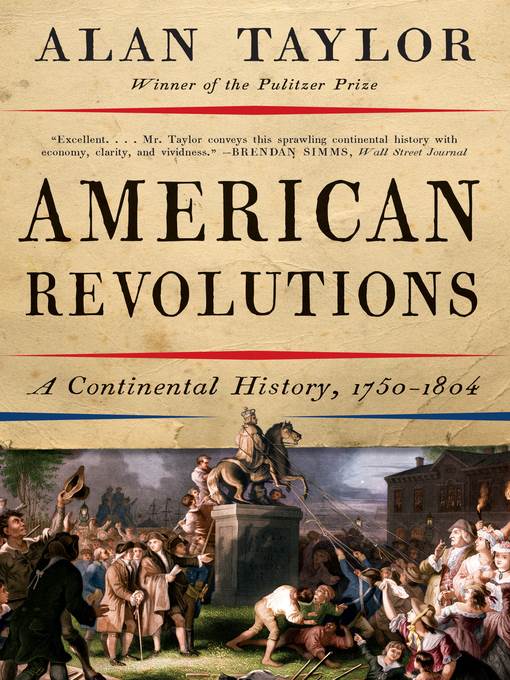
American Revolutions
A Continental History, 1750-1804
کتاب های مرتبط
- اطلاعات
- نقد و بررسی
- دیدگاه کاربران
نقد و بررسی

June 13, 2016
Taylor, professor of history at the University of Virginia and Pulitzer Prize–winner for The Internal Enemy, further cements his reputation with this comprehensive analysis of an American Revolution that was anything but the relatively decorous event of popular myth. The revolutionary era was a time of divisions and uncertainties. “Turmoil persisted after the formal peace treaty,” Taylor writes. But that upheaval inspired political and cultural creativity that enabled a nation to emerge from “much cruelty, violence, and destruction.” Stressing the importance of the trans-Appalachian west, Taylor suggests that the conflict between land-hungry settlers and restrictive British polices was just as important to sparking revolution as the resistance to taxation that inflamed the Atlantic coast. This expanded perspective frames Taylor’s presentation of George Washington’s understanding that “victory hinged on who could endure a long, hard, bitter struggle.” Taylor analyzes “the cycles of invasion, exposure, and suppression” that convinced most Americans that “a Patriot victory offered the best prospect for restoring peace and stability.” He also highlights the “broad and anarchic borderland” where “Patriots fought... to suppress the independence of native peoples” in the name of creating an “empire of liberty.” Provocative and persuasive, Taylor’s fine work demonstrates that on a continent “riven with competing allegiances and multiple possibilities,” the newly independent U.S. by no means faced a secure future.

Starred review from June 15, 2016
A clear, authoritative, well-organized look at the messy Colonial march toward revolution and self-rule.In this broad history, eminent historian Taylor (History/Univ. of Virginia; The Internal Enemy: Slavery and War in Virginia, 1772-1832, 2013, etc.), who has won the Pulitzer Prize (twice), the National Book Award, and the Bancroft Prize, underscores the myriad complex facets to the rebellion against British authority starting in the mid-18th century, especially the westward thrust to settle newly won Indian territory. Between 1754 and 1763, at the conclusion of the Seven Years' War, the British and their colonists had conquered French Canada and claimed the West as far as the Mississippi River. The colonists naturally assumed they would "share in the imperial fruits of victory," but instead, the British authorities aimed to exert greater control over the Colonies, restricting speculation west of the Appalachians by proclamation and extracting much-needed revenue from them to pay for the costly war. Considering themselves "free-born Englishmen," the colonists hoped for a great partnership with the mother country, but they were treated as "distant and wayward inferiors." Compounding the tension, notes the author, was the vacuum of civil government left by the British in the lands to the West between restive Colonial settlers and the resentful Indians. Taylor superbly emphasizes the key role of slaves in the revolutionary period--namely, the contradiction of the colonists' claiming the language of liberty while possessing slaves (to the ridicule by Britons)--and the role of women in spurring and aiding the rebels. Moreover, the author impressively relays the sense of torn loyalties and how the revolutionary associations empowered the common man to step up and participate. He moves through the Revolution itself to the complicated aftermath of partisan politics, exacerbated by the global conflict ignited by the French Revolution. His final chapters on "Partisans" and "Legacies" delineate the first sticky political schisms and the vast postwar challenges in terms of culture, gender, race, and economy. Beautifully organized and accessibly presented history for all readers.
COPYRIGHT(2016) Kirkus Reviews, ALL RIGHTS RESERVED.

April 15, 2016
With Patriots fielding ruffians to harass opponents and local rivalries mattering as much as ideals, the American Revolution was not a pretty affair. Two-time Pulitzer Prize winner Taylor clarifies how it emerged from the ongoing clash of European empires.
Copyright 2016 Library Journal, LLC Used with permission.

























دیدگاه کاربران